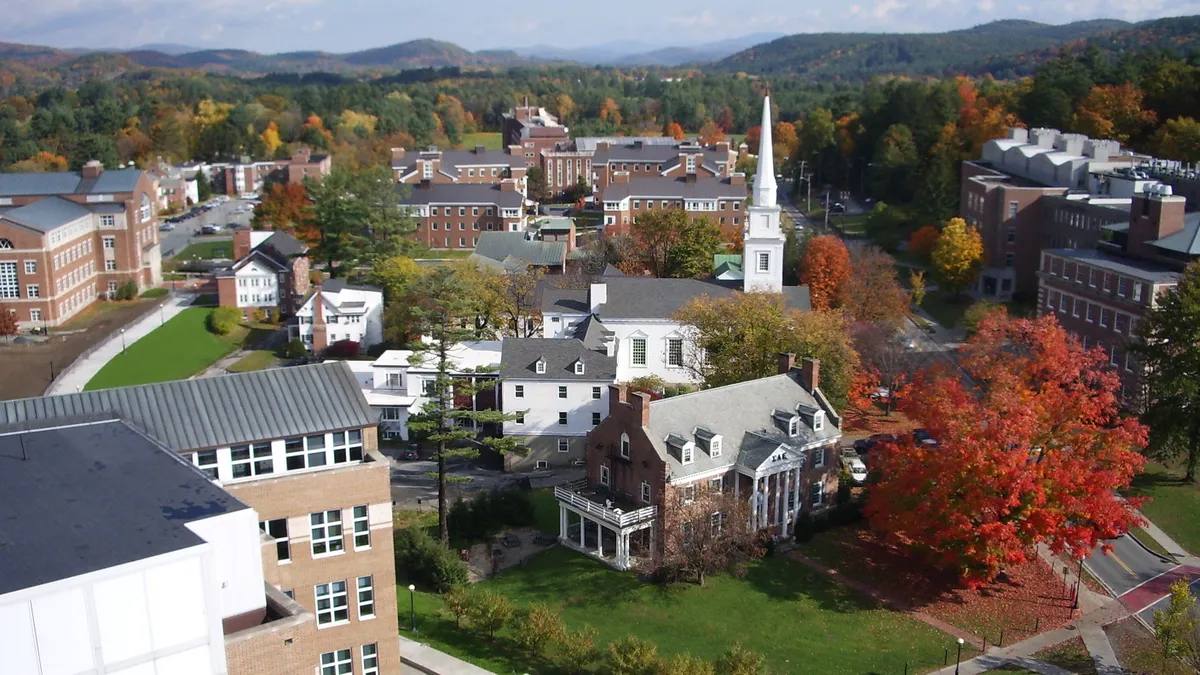Dive Brief:
- Less than two months after a lawsuit alleged a "21st-century Animal House" culture in one academic department, Dartmouth College on Thursday announced plans for an external review of all academic departments, the creation of a single sexual misconduct policy and the expansion of its Title IX office, among other initiatives aiming to create "a learning environment free from sexual harassment and the abuse of power."
- The Campus Climate and Culture Initiative (C3I), as the efforts are collectively known, is based on a recent report on the impact of sexual harassment in higher education. City College of New York Grove School of Engineering Dean Gilda Barabino will chair the committee leading the effort. Barabino also was on the report's task force.
- C3I was in the works prior to an October 2017 sexual misconduct investigation into the allegations outlined in the subsequent lawsuit, the university explained on a website dedicated to the effort, noting that the sexual harassment scandal gave it momentum.
Dive Insight:
Dartmouth did not share the results of the 2017 inquiry, but the lawsuit revealed allegations that three tenured male professors coerced several women into participating in a sexualized culture to avoid losing out on academic and career opportunities. In their lawsuit, the women allege the university mishandled their complaints. The lawsuit seeks $70 million in damages.
In a statement emailed to Education Dive, Deborah Marcuse, partner at Sanford Heisler Sharp and counsel to the seven women plaintiffs, said while they support the college's effort to change its policies, it "continues in its failure to acknowledge or accept responsibility for the damage its long history of inaction has caused." Marcuse added that "until Dartmouth commits to making the women whose 'courage' [Dartmouth] President Hanlon claims to 'admire' full partners in crafting and implementing reforms, each new 'comprehensive initiative' will continue to miss the mark."
Several colleges and universities have faced lawsuits in recent years stemming from allegations that they ignored or failed to properly address complaints of sexual harassment among students, faculty and staff. In 2016 and 2017 alone, 22 public universities and systems shelled out more than $10.5 million across 59 such settlements, The Wall Street Journal reported. Those settlements aim to eliminate or reduce public attention on the matter, and in some cases gave accused faculty and administrators the opportunity for a quiet exit, according to The Journal.
Yet momentum is building around demands for universities to address the issue head-on. One researcher at Michigan State University is keeping a list of substantiated cases of sexual misconduct in higher ed, numbering more than 700. Although the earliest date from 1917, most occurred from the early 2000s to the present. The presence of such a list adds permanence to issues many colleges would rather hide from view.
A 2015 report from the Association of American Universities revealed one in four female undergraduates has experienced sexual assault or misconduct, and that many didn't report because they "did not think anything would be done about it." The survey's findings spurred institutions to change policies and staff up their Title IX offices, The Chronicle of Higher Education reported.
The extent to which colleges are to be held accountable has been cause for uncertainty in recent years, and the Education Department's new proposed rules on sexual misconduct have further complicated the matter. The rules would narrow the definition of sexual harassment and raise the standard determining whether an institution needs to intervene, loosening Obama-era guidance but applying the force of law.
However, several questions remain, Education Dive reported last month, including how harassment that happens off-campus and online would be handled, and how transparent religious institutions would need to be about claiming exemptions.










